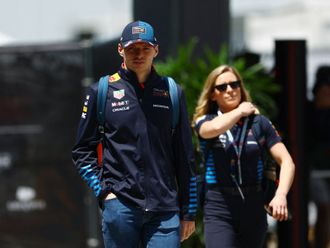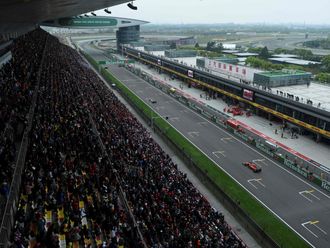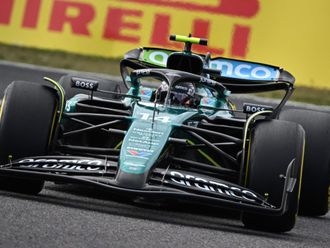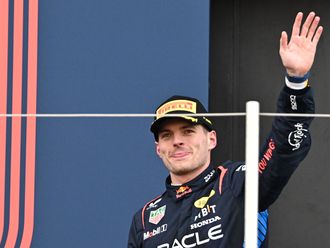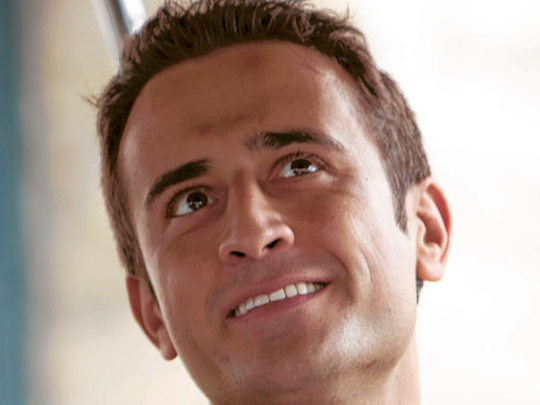
Emirati driver Humaid Al Masoud got his first victory in the LMP1 category of the American Le Mans Series at Baltimore last weekend in his Oryx Dyson Racing team's Mazda MZR-R with teammate Steven Kane. Gulf News caught up with the 30-year-old to discuss the importance of this win in only his first season racing within the format and only his third year in motor sport.
The victory — at this level in world racing — confirms his presence as the UAE's leading representative in global circuit motor sport to date.
Despite not competing at the opening two races of the nine-leg series at Sebring, Florida and Long Beach, California, Al Masoud and Kane took third place podiums at Lime Rock, Connecticut and Mosport, Ontario but recorded consecutive retirements due to radiator failure and a crash at Mid Ohio and Road America, Wisconsin.
After the Baltimore triumph, the pair — who takes turns in the endurance race — sit fourth in the drivers standings with 46 points and third in the team championship.
Gulf News: After that first win what's your Series target?
Humaid Al Masoud: There are only two more races left in the series at Monterey, California and Braselton, Georgia on Saturday and October 1.
We need to try and stay as fast and consistent as possible. Peugoet and Audi will be at the last race and it will be very difficult to beat them as they will be a lot faster, but having said that a lot can happen in a 10 hour race.
Aston Martin will be at California but we are quite confident there, we feel as though we can run as quick the only disadvantage is we don't know the track.
We started midway though the Series so the target has been to get the year done with the best results possible we're using it to learn the tracks and the car.
This is the highest level of performance racing I've driven in I still have to get seat time to feel comfortable.
It's a steep learning curve, but we're on that curve and overall we've done very well — it's just a shame we haven't finished every race.
Is this the biggest achievement of an Emirati circuit driver to date?
I suppose you are correct. Mohammad Bin Sulayem reached a very high level of rally driving — its still motor sport but that's a very different category so you can't really count that.
He's been great for the rallying side, but track and circuit racing here has been in its infancy.
People in the UAE like desert racing and off-roading, rallying covers that.
Since Yas Marina and Dubai Autodrome opened others have come forward to do more circuit type single-seater racing.
Khalid Al Qubaisi has had some good results in the very challenging Porsche Super Cup, while Said Al Mehairi and Shaikh Hasher Al Maktoum have done well in GT4.
They are phenomenal drivers but there are only a few — as it's a small country there can't be thousands but it is growing. I'm proud to represent the UAE and set a good example for the country to world motor sport.
After Yas and Formula One it's good to let the world know we are taking the sport very seriously.
Why Le Mans endurance racing and not Formula One?
For a ten-year-old karting at championship level there's scope for that, but not for someone of my age (30).
If I had got involved earlier I would have attempted to have gone as high as possible.
Having said that I'm extremely happy — Le Mans has an historic following, it's one of the premier series, the cars are very high performance — that appeals to me personally.
I like all kinds of racing but in terms of sponsorship this generates the most appeal. I wanted to be part of the big spectacle so I chose America over Europe.
There were 70,000 people at Baltimore. Also everything in this series is at the specification to compete at Le Mans 24 hour race.
Would competing at Le Mans 24 hour conclude the dream or is there more?
We are looking at options to operate as a fully independent team. At the moment we are running as a sister car to a US team, we run the car but it's theirs.
If we separate, get our own team and our own choice of technology and could compete independently, from a driver standpoint you want to go out fully prepared to make sure you're as competitive as you can be.
The earliest we could be ready is 2012, but 2013 is a very good possibility to race at the Le Mans 24 hour race.
Once there it doesn't all stop. It's such a big challenge, to do it once is not a fair judgement of how you're doing — for a fair chance at it you'd have to do it several times.
In terms of other formats we've got lots on our plate at the moment and don't want to get ahead of ourselves, but the FIA GT1 series started two or three years ago and that's very interesting.
When it gets more serious, and gains more appeal for sponsorship you never know it may get more sponsorship because more people are interested in watching it.
Can you run us through your background in racing?
This is my first season in American Le Mans prototype racing. I've driven a lot of different cars in three years.
I did a season of Radicals in the UAE and finished third, I won the Dubai 24-hour one year and finished second the next.
I did a season of GT4 in Europe and got one podium which was a career high up until last weekend which has become the most memorable achievement by far.
I went to England — where my mother's from — at the age of nine to boarding schools in Kent and Berkshire left at 15 to join a junior tennis academy in Florida where Andy Roddick, Jennifer Capriati and Mardy Fish studied.
When I realised there wouldn't be any Wimbledon for me I played golf in my final year for high school.
I studied International Business at college went into real estate in Florida, now we run a combination of businesses distributing auto products.
Are endurance racers a cut above the rest - given the hours put in?
Whoever is in whatever series will say theirs is the best its all opinion — any form of high level racing that has a large amount of competition has its challenges.
But in Le Mans the car's downforce makes it extremely difficult. You pull lots of g-forces through your neck and body through corners — it's impossible not to hold your breath through bends.
You get fatigued very quickly and make mistakes because it's so physically taxing. It helps to stay fit. Allan McNish is in his forties so there's still time for me yet.
Perhaps maturity calms you and makes you quicker you just have to stay in good shape.


